
|
Nixon (1995)
In Oliver Stone's documentary-drama and biopic with
homage paid to Citizen Kane (1941) with
its flashback structure, dinner-table scene and newsreels - with
a review of the brooding anti-hero Nixon's dark side with fatal flaws:
- the opening prologue: "This film is a dramatic
interpretation of events and characters based on public sources
and an incomplete historical record. Some scenes and events are
presented as composites or have been hypothesized or condensed";
it was followed by the Biblical verse: "For what is a man
profited, if he shall gain the whole world, and lose his own soul?" -
Matthew 16:26
- the first brief sequence was the arrest of five operatives
at the Watergate Hotel in Washington DC in the summer of 1972: (off-screen) "Five
men wearing white surgical gloves, business suits and carrying camera
and electronic surveillance equipment were arrested early today in
the headquarters of the Democratic National Committee in Washington.
They were unarmed. Nobody knows yet why they were there or what they
were looking for"; there was a domino effect, as the burglars
were imprisoned, Presidential aides resigned, a secret White House
taping system was revealed (with a gap in one crucial taped conversation
from 1972), and the Watergate special prosecutor Archibald Cox was
fired by President Nixon
- the first appearance of heavy-drinking Nixon (Oscar-nominated
Anthony Hopkins) alone in the White House one stormy night in late
1973 when visited by his Chief of Staff General Alexander Haig (Powers
Boothe) with three reel-to-reel tapes for the taping system, when
Nixon mused: "You know, Al, if Hoover were alive, these tapes
would never have gotten out....We never got our side of the story
out, Al. People have forgotten. Such violence. The tear gassing,
the riots, burning the draft cards, the Black Panthers. We fixed
it, Al, and they hate me for it. 'Cause it's Nixon. They always hated
Nixon"
- the triggering of the film's many flashbacks, including
a recreation of the 1960 Presidential television debate between Richard
M. Nixon and John F. Kennedy (Himself), when Nixon brashly bragged
and sweated profusely on his upper lip; backstage, handlers worried:
- Murray Chotiner (Fyvush Finkel): "Shoulda slapped a little
makeup on him." H.R. Haldeman (James Woods): "Don't worry.
It's not a beauty contest." Murray: "We'd better hope not"
- the scene of Nixon noisily playing "Happy Days
Are Here Again" on the piano and calling his wife Pat (Oscar-nominated
Joan Allen) a "cocksucker" when she complained about political
life (and then she suggested a divorce) after he lost again (after
defeat in 1960) to incumbent Pat Brown in California during the gubernatorial
race in 1962: ("It's over, Dick....I have always stood by you.
I campaigned for you when I was pregnant. During Checkers, when Ike
wanted you out, I told you to fight. This is different, Dick. You've
changed. Life is tough and it is unfair and sometimes you forget
that in your self-pity. You forget sometimes, Dick that I had a life
before you - before California...You've changed. You've grown more
bitter, like you're at war with the world. You weren't that way before.
I'm 50 years old now, Dick. How many millions of miles have I traveled?
How many millions of peoples' hands have I shaked that I just don't
like? How many thank-you notes have I written? It's as if I, I don't
know, just went to sleep a long time ago and missed the years between.
I've had enough...I want a divorce...This isn't political, Dick.
This is our life")
- Nixon's subsequent press conference with a memorable
concession speech, when he promised to never run again after his
defeat in 1962 against Governor Brown, to prevent a divorce from
Pat when he might lose her forever: ("I believe Governor Brown
has a heart, even though he believes I do not. I believe he's a good
American, even though he feels I am not. I'm proud of the fact that
I defended my opponent's patriotism. You gentlemen didn't report
it, but I'm proud that I did that. And I would appreciate it for
once, gentlemen, if you would just print what I say. For sixteen
years, ever since the Hiss case, you've had a lot of fun - a lot
of fun. But recognize you have a responsibility, if you're against
the candidate, to give him the shaft, but if you do that, at least
put one lonely reporter on the campaign who will report what the
candidate says now and then. Uh, I think, all in all, I've given
as good as I've taken. But as I leave you, I-I want you to know.
Just think what you're gonna be missing. You won't have Nixon to
kick around anymore. Because, gentlemen, this is my last press conference")
|
1962: "You won't have Nixon to kick around
anymore"
|
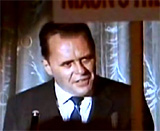
|
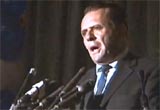
|
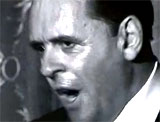
|
- another earlier turning point in 1952 when Nixon
was about to be chosen VP on the Republican Presidential ticket
with war hero General Dwight Eisenhower, and he was accused of
hiding a secret slush fund; he went on national television to shamelessly
and manipulatively plead his case to the nation -- the infamous
"I am not a crook" speech -- he explained his modest financial
history, and a gift from a Texas businessman - a little cocker spaniel
dog that his six year-old daughter Tricia named Checkers: ("Everything
I've earned, spent ... regardless of what they say about him, we're
gonna keep him (the dog)"); the broadcast was later viewed on
television by Pat: (Nixon: "Because people have gotta know whether
or not their president is a crook. Well, I am not a crook. I've earned
everything I have. She doesn't have a mink coat. She does have a
respectable Republican cloth coat. And I always tell her that, uh,
she'd look good in anything")
- Nixon's pitiful speech to the nation in 1973 during
the Watergate scandal, inter-cut with comments from Henry Kissinger
and Alexander Haig (Powers Boothe) (in parentheses) watching on
TV, in which Nixon vowed that he was not a crook once again - in
addition, Pat listened to the speech (while smoking in bed) - reflecting
back on his similar "Checkers"
speech from many years earlier: ("Good evening, my fellow
Americans. Tonight I'm taking an action unprecedented in the history
of this office. I had no knowledge of the cover-up till John Dean
told me about it on March 21st, a year ago. (Oh, I think I'm going
to throw up) ...no payment to Hunt or anyone else be made. (He's
completely lost touch with reality) I've made my mistakes but in
all my years of public life, I have never profited (Can you imagine
what this man would have been had he ever been loved?) I've earned
every penny. In all of my years of public life, I have never obstructed
justice. (It's a tragedy because he had greatness in his grasp)
I welcome this examination. (But he had the defects of his qualities).
Now I made $250,000 from a book (They'll crucify him. Does anybody
really care anymore?) which many of you were good enough to purchase
(And what happens after?) ...every year. When I, in 1968, decided
to become a candidate for the President, I decided to clean the
decks and to put everything in real estate. So, that's where the
money came from. That's all I own. That's what we have, and that's
what we owe. Because people have gotta know whether or not their
president is a crook. Well, I am not a crook. I've earned everything
I have....She doesn't have a mink coat, but she does have a respectable
Republican cloth coat. And I always tell her, uh, she'd look good
in anything... There has never been any feathering of nests. Not
in this administration. Now, let me just say this... And I want
to say this to the television audience...")
- the scene of Nixon's late-night unannounced visit
to the Lincoln Memorial, when he greeted a group of young teenagers
and shook hands: "Hi, I'm Dick Nixon," and then went into
an inept rambling monologue about football but then tried to defend
his unpopular wartime policies in Vietnam: "Well, probably most
of you think I'm a real S.O.B. I know that. I understand how you
feel. But, you know, I want peace too. But peace with honor....Well,
you can't have peace without a price. Sometimes you have to be willing
to fight for peace and sometimes to die"; he stated: "In
fact, we agree on a lot of things, don't we?" but one vocal
female disagreed: "No, we don't. You say you want to end the
war, so why don't you?"; Nixon became flustered when she inferred
that he was powerless within the 'system' to stop the war: "What's
the point of being president? You're powerless!"; when Nixon
responded that he could possibly 'tame' the system, she noted:
"Sounds like you're talking about a wild animal"
Late Night Visit to Lincoln Memorial
and Speaking to a Group of Protestors
|
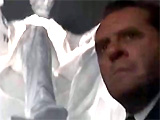
|

|
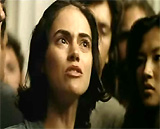
|
- the scene in which a resigning and sobbing President
Nixon in 1974 prayed on his knees in front of a fireplace with
Secretary of State Henry Kissinger (Paul Sorvino); he utterly broke
down, knowing the end was near: "My mother used to pray a
lot. It's been a long time since I really prayed....Never be too
proud to go on your knees before God...How can a, how can a country
come apart like this? What have I done wrong? I opened China. I
made peace with Russia. I ended the war. I did what I thought was
right. Uh - God, why do they hate me so? Is unbelievable. It is
insane. Oh, Mom, I'm sorry. God, please forgive me, God. I really
didn't mean it. I didn't know what to do. I don't know why this
is happening to me. I can't believe..."
- and his poignant late-night conversation with a portrait
of Kennedy: "When they look at you, they see what they want
to be. When they look at me, they see what they ARE..."; he
was comforted by Pat who assured him: "Dick, please don't...It'll
be over soon"; he continued to bemoan his life: "I'm so
afraid. There's darkness out there. I could always see where I was
going. But it's dark out there. God, I've always been afraid of the
dark"

|
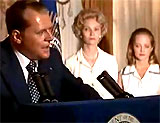
|
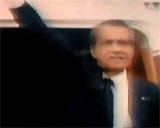
Actual Video Footage of Departure from WH
|
|
1974 Farewell Speech: "My mother was a saint..."
|
|
- his sweaty, final farewell and impromptu late summer
1974 resignation speech after the Watergate disgrace, to his assembled
White House staff, including a long tribute to his mother, before
being taken away on Marine One from the White House lawn: ("...Nobody
will ever write a book, probably, about my mother. Well, I guess
all of you would say this about your mother. My mother was a saint....Yes,
she will have no books written about her. But she was a saint.
Now, however, we look to the future....And as I leave, that's an
example I think all of us should remember. See, we think sometimes
when, uh, things happen that don't go the right way, we think that
when someone dear to us dies, or we lose an election or when we
suffer defeat that all is ended. Not true. It's only a beginning,
always, because the greatness comes, not when things go always
good for you, but the greatness comes when you're really tested,
when you take some knocks, some disappointments, when sadness comes.
Because only if you've been in the deepest valley can you ever
know how magnificent it is to be on the highest mountain. So I
say to you on this occasion we leave, proud of the people who have
stood by us and worked for us and served this government and this
country. They want you to continue to serve in government if that
is what you wish. Remember, always give your best. Never get discouraged.
Never be petty. Always remember, others may hate you. But those
who hate you don't win unless you hate them. And then, you destroy
yourself. And so we leave with high hopes and good spirits and
with deep humility. And I say to each and every one of you, not
only will we always remember you but always you will be in our
hearts. And you'll be in our prayers. And only then will you find
what we Quakers call 'peace at the center'")
- the film's ending: Nixon's funeral service and burial
in April of 1994, when five current living Presidents (Ford, Carter,
Reagan, Bush 41, and then-President Clinton) were in attendance at
the ceremony; the film ended with a narrated epilogue: ("Nixon,
who was pardoned by President Ford, lived to write six books and
travel the world as an elder statesman. For the remainder of his
life, he fought successfully to protect his tapes. The National Archives
spent 14 years indexing and cataloging them. Out of 4,000 hours,
60 hours have been made public")
|

1972: The Watergate Arrests

1973: "We never got our side of the story out...
They always hated Nixon"
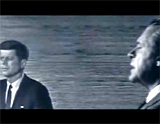
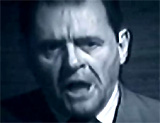
1960: The Televised Presidential Debate During
Campaign against JFK
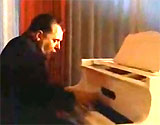
1962: "Happy Days Are Here Again"

Pat Complaining to Dick in 1962: "I want a
divorce"

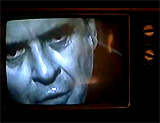
1952 Checkers Speech: "Well, I am not a crook"

1968: Winning the Republican Nomination for President


1973: "I had no knowledge of the cover-up..."
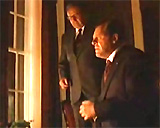

1974: Prayer with Henry Kissinger

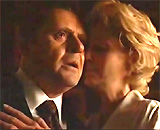
Conversation with JFK's Portrait and Pat's Reassurance
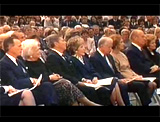
1994: Nixon's Memorial Service
|

















